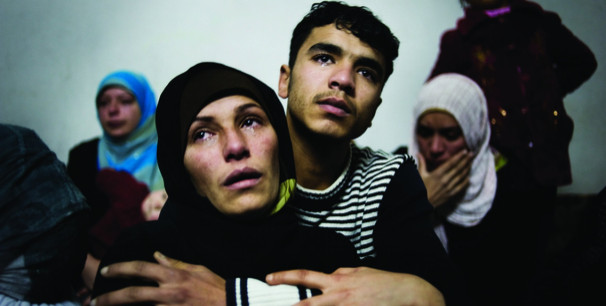Arab Spring Carries Hopes And Burdens Of Democratic Change: HRW Report

The challenge of establishing democracy in the shambles of a totalitarian regime has been rendered in all its dysfunction and disarray by the new governments that have arisen (and some still attempting to rise) in the wake of the Arab Spring.
This sobering reality is the focal point of the 2013 World Report from Human Rights Watch, which provides an annual examination of the state of human rights around the globe.
“Two years into the Arab Spring, euphoria seems a thing of the past,” writes Kenneth Roth, executive director of HRW, in his introduction to the report.
“The heady days of protest and triumph have been replaced by outrage at the atrocities in Syria, frustration that the region’s monarchs remain largely immune to pressure for reform, fear that the uprisings’ biggest winners are Islamists who might limit the rights of women, minorities, and dissidents, and disappointment that even in countries that have experienced a change of regime, fundamental change has been slow and unsteady,” he adds.
“Difficult as it is to end abusive rule, the hardest part may well be the day after.”
The 665-page report looks specifically at human rights issues in over 80 countries, including the United States, but the social and political upheavals throughout North Africa and the Middle East over the past two years have been given special attention due to their collective immensity as a reactionary phenomenon to globalization, as well as each individual nation’s struggle to establish the rule of law and a democratic system.
“It should be no surprise that building a rights-respecting democracy on a legacy of repression is not easy,” Roth writes. “But … the uncertainties of freedom are no reason to revert to the enforced predictability of authoritarian rule. The path ahead may be treacherous, but the unthinkable alternative is to consign entire peoples to a grim future of oppression.”
“The past year offers some key lessons for success in this venture -- as valid globally as they are for the states at the heart of the Arab Spring,” he adds.
The new governments of Egypt and Libya, for example, have demonstrated the process of political transition from dictatorship to democracy as anything but smooth.
Egypt’s first democratically elected president, Mohammed Morsi, has become the object of criticism and ridicule -- much like his autocratic predecessor, Hosni Mubarak -- due to his overreaching leadership, erosion of democratic institutions and failure to uphold the rights of minority groups.
Libya’s example demonstrates the opposite -- a void of leadership.
“Among the Arab Spring states, Libya best illustrates the problem of a weak state,” Roth writes. “No longer plagued by the dictatorship of Muammar Gadhafi and its repressive grip, Libya suffers foremost from a lack of government -- one that is dedicated to respecting rights and capable of enforcing them.”
Roth explains how Libya is fractured, with various militia groups that helped to overthrow Gadhafi controlling different parts of the country, virtually nullifying any consistent rule of law put forth by the ineffectual central government and creating an environment ripe for human rights abuses.
Syria, another country in the region going through upheaval, remains steeped in armed conflict as the authoritarian regime of President Bashar al-Assad tightens its grip on power.
“Syrians do not yet have the luxury of erecting a rights-respecting democracy,” Roth writes. “At this writing, opposition forces are fighting the brutal dictatorship of President Bashar al-Assad, and the world has been at once preoccupied with stopping the slaughter of civilians by Assad’s forces and ineffective at doing so. Tens of thousands have been killed.”
Roth mentions the role of Russia and China in obstructing multilateral efforts at the United Nations Security Council to take punitive measures against Assad’s government, but also chides other nations for not putting more pressure on those two governments.
“Russia and China do not pretend to set a democratic example,” Roth writes. “Rather, they are preoccupied with preventing the inspiration of the Arab Spring from catching on at home.”
“Despite their power, the international community should regularly speak out against their repression, both for the sake of the Russian and Chinese people, and because these highly visible examples of repression embolden authoritarian leaders worldwide who seek to resist the same currents in their own countries,” he adds.
Roth frames the Arab Spring as a unique event that continues to shake the foundations of authoritarian rule the world over, but warns that the fledgling governments run the risk of losing all freedoms gained if a democratic rule of law is not established.
“The Arab Spring continues to give rise to hope for an improved human rights environment in one of the regions of the world that has been most resistant to democratic change,” Roth writes in his concluding remarks. “Yet it also spotlights the tension between majority rule and respect for rights.”
“It is of enormous importance to the people of the region -- and the world -- that this tension be resolved with respect for international standards,” he adds.
“A positive resolution will require acts of great statesmanship among the region’s new leaders. But it will also require consistent, principled support from the most influential outsiders. No one pretends it will be easy to get this right. But no one can doubt the importance of doing so.”
© Copyright IBTimes 2024. All rights reserved.





















